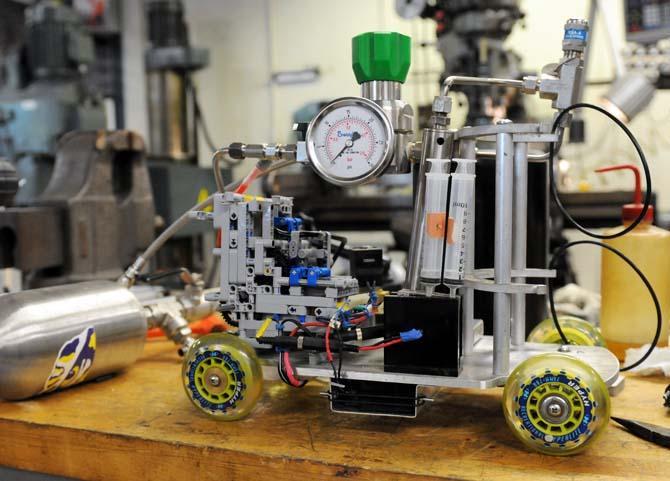In an era increasingly defined by the development of new sustainable technologies and practices, the University has expanded its analytical programs to keep its graduates competitive in local and global job markets.
The College of Engineering raised more than $100 million in public and private funds to renovate Patrick F. Taylor Hall and to expand its chemical engineering facilities. Private donors included MMR, Entergy, Phillips 66, BASF, FLUOR and Turner Industries. The state matched these funds dollar-for-dollar.
Engineering students took advantage of their expanding program and applied the skills they learned in class to develop real solutions to real problems. Students built canoes, cars run by chemical reactions and airplanes to represent the University in global contests. Seniors built door breakers, mobile targeting systems and submarines to demonstrate their mastery of the curriculum.
In April, the Coastal Sustainability Studio was awarded a $50,000 award by the W.M. Keck Foundation for the establishment of a new cross-disciplinary program that will prepare students for careers in fighting coastal challenges and developing ways to sustain both economic and ecological productivity in coastal environments.
The College of Science also received funding for the expansion of its research technologies. In January, the W.M. Keck Foundation awarded chemistry professor Les Butler $500,000 for the construction of an advanced X-ray machine that will be available for use by researchers throughout the University. Its capabilities nearly mirror those of multi-million dollar pieces of equipment in the Center for Advanced Microstructures and Devices.
Additionally, the University’s Earth Scan Lab received an important upgrade in February that reduces the hours it once took to process satellite data to minutes. ESL’s satellites record images of ocean eddies that can be used to locate oil activity throughout the Gulf Coast. The Earth Scan Lab is maintained by the Department of Oceanography and Coastal Sciences at the School of Coast and Environment.
The LSU Louisiana Business and Technology Center hosted a Student Incubator Venture Challenge that concluded in April to award student entrepreneurs with both monetary rewards and financial advice. The center also facilitated the Baton Rouge Speech and Hearing Foundation’s transformation into the Emerge Center for Communication, Behavior and Development in Innovation Park.
The University’s Agricultural Center continued to commit itself to economic growth and ecological stability. Its Food Incubator helped businesses develop new food products, and researchers found new uses for existing foods like resistant starches, which were found to aid in combating diabetes.
With all of these new innovations and expansions, graduates of the analytical college are well-equipped to address the scientific and technological challenges of the 21st century.
Analytical colleges get new facilities, increased funding
By Panya Kroun
May 4, 2014
Chemical engineering students built a car fueled by chemical reactions and competed in Puerto Rico at the American Institute of Chemical Engineers regional conference’s car competition on March 22.





